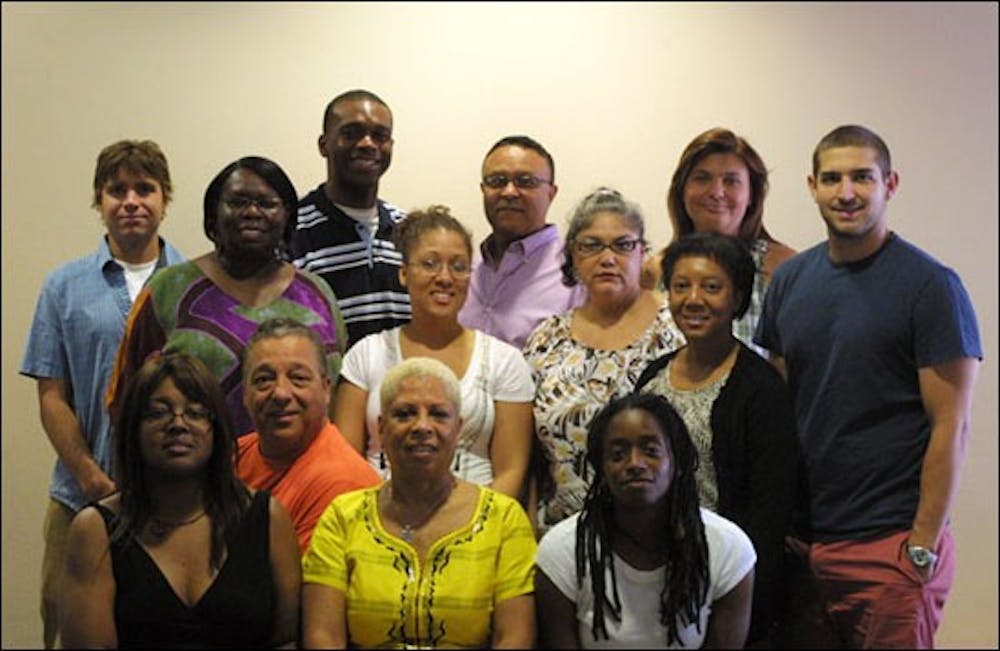During a workshop on the West campus, professor Duku Anokye wrote notes on a white board outlining a future teaching curriculum that would be implemented following her trip to Ghana.
Fellow travelers scribbled busily about Ghanaian folktales, culture and history— subjects they wanted to explore with future elementary and high school students.
ASU graduate students and faculty, along with high school and elementary school teachers, are traveling to Ghana for a month seminar in July.
They will create curricula for students by using their travel journals and other resources and make a documentary film about the trip, the country’s history and its culture, including the effect of slavery.
The trip is funded by more than $73,000 from a Fulbright-Hays Group Project Abroad grant, and all 13 group members will have most of their expenses paid.
“The purpose of a Fulbright-Hays GPA is to give teachers an opportunity to learn about a culture, a society, and to bring it back and incorporate it into their curriculum,” said Anokye, who is the associate director of the Humanities, Arts and Cultural Studies Division of the New College of Interdisciplinary Arts and Sciences.
Anokye plans to focus on the history of slavery and current human trafficking.
She has been to Ghana several times in the past and said the group will visit many places including the capital, Accra, and two slave castles.
She said one of the castles has a “door of no return.”
“This is where slaves were captured,” Anokye said. “Africans were put into ships in the dark of night and taken away to the New World to be slaves.”
Some other highlights of the trip include lectures on various topics, participation in a dance and drumming class, volunteering, interviewing Ghana natives, visiting shrine areas and churches, museums and markets.
The travelers will stay in bed-and-breakfast inns, though they usually won’t be in one place for more than five days.
The grant is called “Stories From the Other Side,” she said.
“We hope to come back and be able to tell stories from the perspective of Africans who were left behind during the slave trade, in particular,” Anokye said. “We hear about what happened to the slaves once they came to the New World, but rarely do we hear about what happened to the people who were left behind.”
She wants to know how losing people in a village can affect the people in that village.
“We can see the evidence of what has happened because we’re talking about Ghana and other places in Africa as ‘third-world,’” Anokye said. “Had not slavery occurred as it did in those countries, would they still be considered developing today? When your population is decimated by something as serious and as detrimental as this, what are the effects?”
Les Irwin, an associate professor in the Mary Lou Fulton Teachers College and one of the group members, was born in Ghana and has visited multiple times, including when he went in 2003 as a visiting professor from the University of Education at Winneba.
“The main fact that we are going to go into the country —we’re going to be immersed in it — will give us a very good inspirational feel in addition to the academic aspect,” said Irwin, who speaks three Ghanaian languages.
Part of the purpose of the workshop before the trip is to teach some of the customs and basics of a dominant language, Twi, though Ghana used to be a British colony, so most of the people speak English, he said.
He said one of the main customs travelers need to adhere to is not using the left hand to point or to give an object to someone.
“As long as we are aware of the diversity that exists, I think we are able to cope,” Irwin said.
Paul Bork, a social justice and human rights master’s student, said he thought one of the reasons he was selected for the trip was because of his technological skills, which include filming. Bork will help with the documentary.
He said he went to Rwanda for a year but hasn’t been to West Africa before, and he is interested in human trafficking and slavery in a human rights context as part of his studies.
“I wanted to explore that area a little bit more and get a real first-hand look at it, along with the historical slavery [and] the effects that it’s had on the people of Ghana today,” Bork said.
He said he has reflected on how he was taught about slavery in school.
“I wish that I had been taught a more vivid and real account, even though it might have been disturbing as a young person,” Bork said. “It’s the truth, and I wish I would have gotten that, because I felt that it’s kind of brushed over.”
For example, he said the slave history is written in a way that makes it not really “our fault.”
“I think that needs to change,” Bork said. “People don’t like to hear things that don’t sit well with them.”
Besides the slave castles, he said he is looking forward to visiting the markets, because they are the “life blood of the community.”
“Sitting in a little room with a 12-inch TV, drinking the local beer, watching the World Cup, will probably be another extremely amazing time,” Bork said jokingly.
Reach the reporter at reweaver@asu.edu





